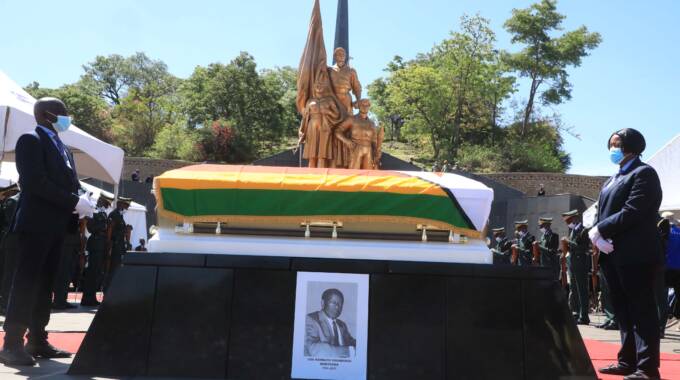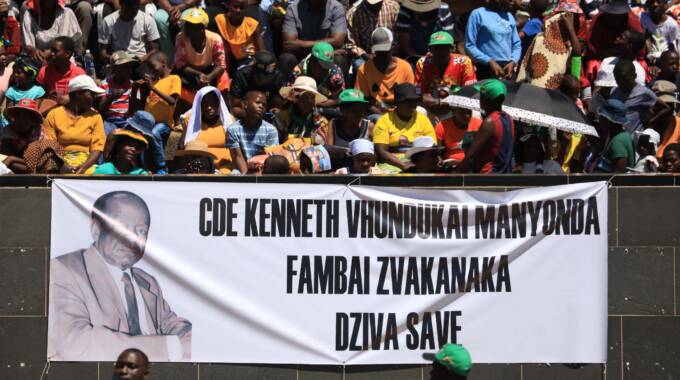
The Sunday Mail

Harmony Agere
Rural district councils should modernise growth points to drive rural industrialisation and transform the quality of life in communities, President Mnangagwa has said.
In his speech at the burial of national hero Cde Kenneth Vhundukai Manyonda, the President also said every citizen had a duty to lift fellow countrymen from poverty.

Cde Manyonda died on Wednesday last week.
He was 88.
“Today, our country is experiencing rapid modernisation, with modern structures sprouting at almost all growth points, towns and cities,” said President Mnangagwa.
“With this rapid urbanisation, it is important that all our growth points are serviced by modern and efficient reticulation systems. I, thus, call upon rural district councils across the country to raise their bar by providing supporting infrastructure for these settlements.”
He said Cde Manyonda had long undertaken various programmes to improve livelihoods in rural communities.
“Always with the people, Cde Manyonda introduced a heifer pass-on scheme in Buhera well before our Land Reform Programme,” he added.
“He understood the importance of an empowered people and undertook programmes to uplift his fellow countrymen from poverty. This is a trait that all of us across the socio-economic and political strata must emulate.”
In the spirit of empowering vulnerable communities, the President said, resources from devolution funds must result in better infrastructure and services across the country.
“Our people are further encouraged to leverage on the rural industrialisation agenda to transform our countryside for a higher quality of life and increased incomes at grassroots level,” he said.
“As we pay last respects to our national hero, I urge professionals and the youth in particular to be agents and champions of diversified agriculture systems, investment, industrialisation and transformation.
“Rural electrification and new solar power technologies, complemented by the massive rural borehole drilling programme being undertaken by my Government, are changing the rural landscape.”
President Mnangagwa said current developmental projects should motivate Zimbabweans to redirect resources and personal savings towards the modernisation and transformation of the country’s rural areas.
“Brick by brick and stone upon stone, let us individually and collectively build, develop and modernise every part of our country, emboldened by our development mantra ‘Nyika inovakwa nevene vayo, Ilizwe lakhiwa ngabanikazi balo’,” he said.
“Through the ongoing people-centred policies, rural industrialisation is being prioritised to ensure development which encourages the involvement of all people and communities, thus, leaving no one and no place behind.
“Today, under what we have dubbed the Fourth Chimurenga, Chimurenga Chepfungwa, we are accelerating mindset change amongst our people.”
Despite being a small nation, the President added, the Second Republic is thinking big to create more employment and empowerment opportunities.
“Primary products must be value added to improve incomes and a higher quality of life for our people,” he said.
“We are a small nation, but we are thinking big and creating more employment and empowerment opportunities for our people as we develop, modernise and industrialise our motherland, Zimbabwe.”

The Manyonda family spokesperson, Professor Isaac Manyonda, who is also the first-born of the late veteran politician, thanked the President and ZANU PF for bestowing the national hero status on the nationalist.
Born in Buhera in 1934, Cde Manyonda grew up under settler colonial conditions and racial discrimination that spurred him to join politics, becoming a member of the Southern Rhodesia African National Congress, which had been formed in 1958.
When the party was banned, he joined fellow nationalists in the National Democratic Party (NDP), which was, in turn, also banned barely a year after its formation.
Undeterred, the late veteran nationalist and his colleagues joined the Zimbabwe African People’s Union (ZAPU), and became its branch chairperson in Gweru.
In 1963, there was a split in the nationalist movement, which saw Cde Manyonda joining the Zimbabwe African National Union (ZANU).
He became the vice chairperson of ZANU’s Gweru branch and was part of key organisers for ZANU’s inaugural congress a year later in Gweru, in 1964.
In the 1970s, Cde Manyonda left Rhodesia for studies in the United Kingdom, where he continued to work for ZANU.
After independence, he returned home and was elected Member of Parliament in Buhera.
Later, he served with diligence and loyalty as Deputy Minister for Industry and Commerce.
He was also appointed governor of Manicaland province, a position he held with utmost dedication until his retirement from active politics and public service.
He remained active in ZANU PF and within the traditional governance architecture under the Nerutanga chieftaincy of Buhera.



